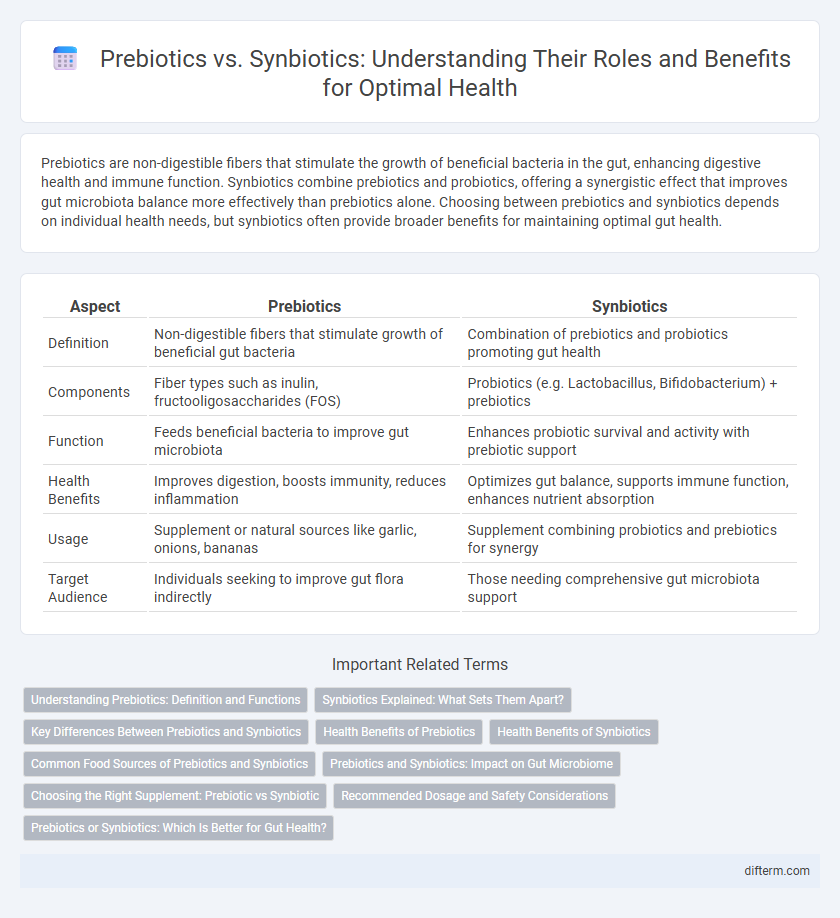Prebiotics are non-digestible fibers that stimulate the growth of beneficial bacteria in the gut, enhancing digestive health and immune function. Synbiotics combine prebiotics and probiotics, offering a synergistic effect that improves gut microbiota balance more effectively than prebiotics alone. Choosing between prebiotics and synbiotics depends on individual health needs, but synbiotics often provide broader benefits for maintaining optimal gut health.
Table of Comparison
| Aspect | Prebiotics | Synbiotics |
|---|---|---|
| Definition | Non-digestible fibers that stimulate growth of beneficial gut bacteria | Combination of prebiotics and probiotics promoting gut health |
| Components | Fiber types such as inulin, fructooligosaccharides (FOS) | Probiotics (e.g. Lactobacillus, Bifidobacterium) + prebiotics |
| Function | Feeds beneficial bacteria to improve gut microbiota | Enhances probiotic survival and activity with prebiotic support |
| Health Benefits | Improves digestion, boosts immunity, reduces inflammation | Optimizes gut balance, supports immune function, enhances nutrient absorption |
| Usage | Supplement or natural sources like garlic, onions, bananas | Supplement combining probiotics and prebiotics for synergy |
| Target Audience | Individuals seeking to improve gut flora indirectly | Those needing comprehensive gut microbiota support |
Understanding Prebiotics: Definition and Functions
Prebiotics are non-digestible fibers that selectively stimulate the growth and activity of beneficial gut bacteria, enhancing digestive health and immune function. These compounds, commonly found in foods such as garlic, onions, and bananas, serve as food sources for probiotics, promoting a balanced microbiome. Understanding the functions of prebiotics is essential for optimizing gut flora and preventing gastrointestinal disorders.
Synbiotics Explained: What Sets Them Apart?
Synbiotics combine prebiotics and probiotics to enhance gut health more effectively than prebiotics alone by promoting the growth and survival of beneficial bacteria. This synergistic relationship improves digestion, strengthens the immune system, and supports overall microbiome balance. Research shows synbiotics can reduce symptoms of irritable bowel syndrome and improve nutrient absorption compared to using prebiotics or probiotics separately.
Key Differences Between Prebiotics and Synbiotics
Prebiotics are non-digestible fibers that nourish beneficial gut bacteria, while synbiotics combine prebiotics with probiotics to enhance gut microbiota health synergistically. Prebiotics primarily serve as food for existing probiotics, whereas synbiotics introduce live beneficial bacteria alongside their preferred nutrients for improved colonization. The key difference lies in synbiotics' dual action of delivering live microbes and supporting their growth, offering more comprehensive digestive and immune system benefits.
Health Benefits of Prebiotics
Prebiotics enhance gut health by selectively nourishing beneficial bacteria, improving digestion and immune function. They support the production of short-chain fatty acids, which reduce inflammation and promote colon health. Regular intake of prebiotics is linked to better nutrient absorption and a lower risk of gastrointestinal disorders.
Health Benefits of Synbiotics
Synbiotics, a combination of prebiotics and probiotics, enhance gut health more effectively than prebiotics alone by improving the balance and activity of beneficial microorganisms in the digestive system. They support immune function, reduce inflammation, and may help prevent gastrointestinal disorders such as irritable bowel syndrome and inflammatory bowel disease. Clinical studies highlight synbiotics' role in promoting nutrient absorption and overall digestive wellness, contributing to better metabolic health and reduced risk of chronic diseases.
Common Food Sources of Prebiotics and Synbiotics
Common food sources of prebiotics include chicory root, garlic, onions, leeks, asparagus, bananas, and whole grains, which are rich in inulin and fructooligosaccharides (FOS). Synbiotics combine prebiotics with probiotics, typically found in fermented foods like yogurt, kefir, sauerkraut, kimchi, and tempeh, enhancing gut health by promoting beneficial bacteria growth. Consuming a balanced diet with both prebiotics and synbiotics supports digestive function, immune response, and overall microbiome diversity.
Prebiotics and Synbiotics: Impact on Gut Microbiome
Prebiotics are nondigestible fibers that selectively stimulate the growth of beneficial gut bacteria, enhancing microbiome diversity and metabolic activity. Synbiotics combine prebiotics and probiotics to synergistically improve gut health by promoting colonization of live beneficial microbes and supporting their growth. Research demonstrates that both prebiotics and synbiotics positively modulate the gut microbiome, reducing inflammation and improving intestinal barrier function.
Choosing the Right Supplement: Prebiotic vs Synbiotic
Choosing the right supplement involves understanding that prebiotics primarily serve as food for beneficial gut bacteria, enhancing digestive health and nutrient absorption. Synbiotics combine prebiotics and probiotics, offering a synergistic effect to improve gut microbiota balance and immune function more effectively than prebiotics alone. Opting for synbiotics is ideal for individuals seeking comprehensive gut health support, while prebiotics may suffice for maintaining existing microbial balance.
Recommended Dosage and Safety Considerations
Prebiotics are typically recommended at doses ranging from 3 to 10 grams daily to promote gut health, while synbiotics, combining prebiotics and probiotics, generally require 1 to 10 billion CFU (colony-forming units) per serving alongside prebiotic fibers. Safety considerations emphasize starting with low doses to minimize gastrointestinal discomfort such as bloating or gas, especially in sensitive individuals or those with underlying conditions. Consulting healthcare providers is advised to tailor dosage, particularly for immunocompromised patients, to ensure optimal benefits while mitigating risks.
Prebiotics or Synbiotics: Which Is Better for Gut Health?
Prebiotics are non-digestible fibers that selectively nourish beneficial gut bacteria, enhancing microbial diversity and promoting digestive health. Synbiotics combine prebiotics and probiotics, offering a synergistic effect that improves gut microbiota balance more effectively than prebiotics alone. Research indicates synbiotics may provide superior benefits for gut health by simultaneously introducing beneficial bacteria and the substrates needed for their growth.
Prebiotics vs Synbiotics Infographic

 difterm.com
difterm.com